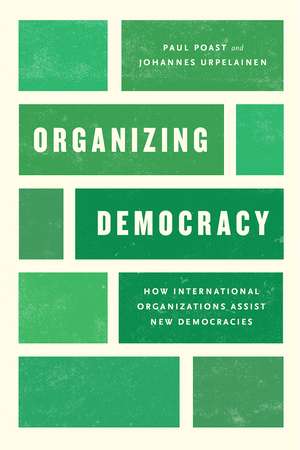Organizing Democracy: How International Organizations Assist New Democracies: Chicago Series on International and Domestic Institutions
Autor Paul Poast, Johannes Urpelainenen Limba Engleză Paperback – 23 apr 2018
In the past twenty-five years, a number of countries have made the transition to democracy. The support of international organizations is essential to success on this difficult path. Yet, despite extensive research into the relationship between democratic transitions and membership in international organizations, the mechanisms underlying the relationship remain unclear.
With Organizing Democracy, Paul Poast and Johannes Urpelainen argue that leaders of transitional democracies often have to draw on the support of international organizations to provide the public goods and expertise needed to consolidate democratic rule. Looking at the Baltic states’ accession to NATO, Poast and Urpelainen provide a compelling and statistically rigorous account of the sorts of support transitional democracies draw from international institutions. They also show that, in many cases, the leaders of new democracies must actually create new international organizations to better serve their needs, since they may not qualify for help from existing ones.
With Organizing Democracy, Paul Poast and Johannes Urpelainen argue that leaders of transitional democracies often have to draw on the support of international organizations to provide the public goods and expertise needed to consolidate democratic rule. Looking at the Baltic states’ accession to NATO, Poast and Urpelainen provide a compelling and statistically rigorous account of the sorts of support transitional democracies draw from international institutions. They also show that, in many cases, the leaders of new democracies must actually create new international organizations to better serve their needs, since they may not qualify for help from existing ones.
Preț: 162.23 lei
Preț vechi: 199.82 lei
-19% Nou
Puncte Express: 243
Preț estimativ în valută:
31.05€ • 32.29$ • 25.63£
31.05€ • 32.29$ • 25.63£
Carte indisponibilă temporar
Doresc să fiu notificat când acest titlu va fi disponibil:
Se trimite...
Preluare comenzi: 021 569.72.76
Specificații
ISBN-13: 9780226543482
ISBN-10: 022654348X
Pagini: 256
Ilustrații: 14 line drawings, 21 tables
Dimensiuni: 152 x 229 x 15 mm
Greutate: 0.37 kg
Ediția:1
Editura: University of Chicago Press
Colecția University of Chicago Press
Seria Chicago Series on International and Domestic Institutions
ISBN-10: 022654348X
Pagini: 256
Ilustrații: 14 line drawings, 21 tables
Dimensiuni: 152 x 229 x 15 mm
Greutate: 0.37 kg
Ediția:1
Editura: University of Chicago Press
Colecția University of Chicago Press
Seria Chicago Series on International and Domestic Institutions
Notă biografică
Paul Poast is assistant professor in the Department of Political Science at the University of Chicago and a research affiliate of the Pearson Institute for the Study of Global Conflicts. He is the author of The Economics of War. Johannes Urpelainen is the Prince Sultan Bin Abdulaziz Professor of Energy, Resources, and Environment in the Paul H. Nitze School of Advanced International Studies at Johns Hopkins University. He is the author or coauthor of four books, including Cutting the Gordian Knot of Economic Reform.
Cuprins
Preface
Chapter 1. Introduction
Part 1. A Theory of Democratization and International Organizations
Chapter 2. From Democratization to International Organizations
Chapter 3. From International Organizations to Democratic Consolidation
Part 2. Quantitative Evidence
Chapter 4. Quantitative Evidence on Forming versus Joining
Chapter 5. Quantitative Evidence on Democratic Consolidation and International Organizations
Part 3. Qualitative Evidence
Chapter 6. The Baltic Experience
Chapter 7. Forming, Remodeling, and Reforming: Expanding the Evidence and Implications
Chapter 8. Conclusion
Notes
Bibliography
Index
Bibliography
Index
Recenzii
“Poast and Urpelainen combine insights from comparative politics and international relations with their own cutting-edge research to show that international organizations are instrumental in cementing democracy by providing technical assistance and public goods, as well as a stepping stone to joining more ‘lucrative’ IOs. With clearly written explanations of complex arguments, their book will be a valuable addition to both fields and to practitioners engaged in democracy promotion, especially those who work for or with international organizations.”
“With Organizing Democracy, Poast and Urpelainen provide new insights into the relationship between international organizations and democratization, arguing both that IOs support democratization and that IOs can be created because of the demands of transitional states. Transitional states are often willing but unable to increase public goods provision, and therefore benefit from the support of IOs, even when they must create them. Their novel argument deepens our understanding of the IO-democracy relationship.”
"Organizing Democracy is an ambitious book. . . . Poast and Urpelainen's exceptional quality of research produces a theoretically insightful and empirically sophisticated volume that will leave an indelible mark on enduring debates about democratization, institutional design, and the link between domestic politics and international systemic factors such as IOs."
"Poast and Urpelainen provide convincing theoretical insights and robust empirical evidence that shed new light on the challenges faced by democratising states and on how IOs can help address these problems. The proposed argument is nuanced: the authors distinguish between forming and joining an IO, treat democratic consolidation and authoritarian reversal separately, account for the possible mediating effect of military rule legacy in the IO-consolidation relationship, and consider various ways in which a new IO might be created,reformed or remodeled. The empirical analysis is designed in a similarly accurate way. The econometric tests generally support the hypotheses. The in-depth investigation of the case studies is very informative."
"Organizing Democracy is a careful and diplomatic assessment of how the Baltic States sought to join NATO to provide a security blanket after the trauma of Soviet occupation, and, also, how, albeit from a different perspective, former British colonies in the Caribbean, especially Barbados, gained a seat at the table of liberal democratic regimes."





